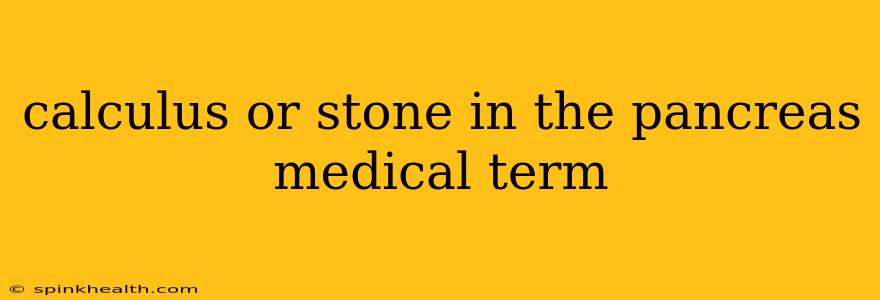The medical term for a stone or calculus in the pancreas is pancreatic calculi. These aren't as common as gallstones, but they can cause significant problems. Imagine this: your pancreas, a vital organ responsible for producing enzymes crucial for digestion and hormones like insulin, is suddenly obstructed by a hard, mineral deposit. That's the reality of pancreatic calculi. This isn't just a minor inconvenience; it's a condition that demands medical attention. Let's delve deeper into this often-overlooked aspect of pancreatic health.
What are Pancreatic Calculi?
Pancreatic calculi are concretions, essentially hard masses, that form within the pancreatic duct system. These ducts are the tiny channels responsible for carrying the pancreatic juices (enzymes) to the small intestine. These calculi can vary in size, from tiny grains of sand to larger stones that completely block the duct. Their composition is primarily calcium salts, but other substances can contribute to their formation.
What Causes Pancreatic Stones?
The exact reasons behind the formation of pancreatic calculi are not always fully understood, but several factors play a role:
-
Chronic Pancreatitis: This is a major culprit. Chronic inflammation of the pancreas leads to a buildup of calcium and other minerals, which eventually solidify into stones. Think of it like a slow, ongoing process of mineral deposition within the damaged pancreatic duct system.
-
Genetic Predisposition: Some individuals may be genetically more prone to developing pancreatic calculi. Family history of pancreatitis or pancreatic disorders can increase the risk.
-
High Calcium Levels: Hypercalcemia, a condition characterized by abnormally high calcium levels in the blood, can contribute to stone formation.
-
Alcohol Abuse: Chronic alcohol consumption is a known risk factor for pancreatitis, and consequently, for the development of pancreatic stones.
-
Certain Medications: In rare cases, some medications have been linked to an increased risk.
What are the Symptoms of Pancreatic Calculi?
The symptoms of pancreatic calculi often mirror those of pancreatitis, but the severity can vary greatly depending on the size and location of the stones:
-
Abdominal Pain: This is often the most prominent symptom, typically felt in the upper abdomen and can radiate to the back. The pain can be severe and persistent.
-
Nausea and Vomiting: The blockage of the pancreatic duct can lead to nausea and vomiting.
-
Weight Loss: Due to impaired digestion and malabsorption of nutrients, individuals may experience unintentional weight loss.
-
Jaundice: If the stones block the common bile duct (which shares a pathway with the pancreatic duct), it can cause a buildup of bilirubin, leading to yellowing of the skin and eyes (jaundice).
-
Steatorrhea: This refers to fatty, foul-smelling stools, a result of impaired fat digestion due to the lack of pancreatic enzymes.
How are Pancreatic Calculi Diagnosed?
Diagnosing pancreatic calculi typically involves a combination of imaging techniques and blood tests:
-
Abdominal Ultrasound: This is a relatively non-invasive imaging method that can often identify stones.
-
CT Scan: A computed tomography scan provides a more detailed image of the pancreas and surrounding structures.
-
Endoscopic Retrograde Cholangiopancreatography (ERCP): This procedure involves inserting a thin, flexible tube through the mouth to visualize and potentially remove the stones.
-
Blood Tests: Blood tests can help assess pancreatic enzyme levels and other indicators of pancreatic dysfunction.
How are Pancreatic Calculi Treated?
Treatment for pancreatic calculi depends on several factors, including the severity of symptoms, the size and number of stones, and the overall health of the individual. Options may include:
-
ERCP (Endoscopic Retrograde Cholangiopancreatography): This procedure is often used to remove stones through a minimally invasive approach.
-
Surgery: In some cases, surgery may be necessary, particularly if the stones are large or numerous, or if there is significant damage to the pancreas.
-
Medication: Pain management medications and other supportive therapies might be needed to alleviate symptoms.
Can Pancreatic Calculi be Prevented?
While there's no guaranteed way to prevent pancreatic calculi, adopting a healthy lifestyle can significantly reduce your risk:
-
Maintaining a healthy weight: Obesity increases the risk of pancreatitis.
-
Avoiding excessive alcohol consumption: Alcohol is a known risk factor for pancreatitis.
-
Managing underlying conditions: Effectively managing conditions such as hypercalcemia can help.
This information is for general knowledge and shouldn't be considered medical advice. Always consult with a healthcare professional for diagnosis and treatment of any medical condition. They can provide personalized recommendations based on your individual situation and health history.

